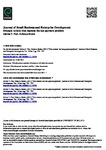Size matters: the late payment problem
| dc.contributor.author | Paul, S | |
| dc.contributor.author | Boden, R | |
| dc.date.accessioned | 2018-04-23T15:53:13Z | |
| dc.date.available | 2018-04-23T15:53:13Z | |
| dc.date.issued | 2011-01-01 | |
| dc.identifier.issn | 1462-6004 | |
| dc.identifier.uri | http://hdl.handle.net/10026.1/11331 | |
| dc.description.abstract |
<jats:sec><jats:title content-type="abstract-heading">Purpose</jats:title><jats:p>The supply of trade credit by small‐ to medium‐sized enterprises (SMEs) is the product of both customer demand and the possibility of strategic advantage, but is subject to risk. In the current financial climate the demand for trade credit may be heightened, leading to further increased risk. This paper seeks to evaluate current risk mitigation measures in the UK and considers how these might be improved.</jats:p></jats:sec><jats:sec><jats:title content-type="abstract-heading">Design/methodology/approach</jats:title><jats:p>The supply of and demand for trade credit and the inherent risks are explained by reference to the literature. Then, using both the academic and grey literature and data from a large‐scale questionnaire, the paper highlights the limitations of both regulatory and management approaches to mitigate the risks in the context of UK SMEs. Finally, the paper considers the prospects for improved management.</jats:p></jats:sec><jats:sec><jats:title content-type="abstract-heading">Findings</jats:title><jats:p>Trade credit may be a product of market demand or a desire to extract strategic advantage. Both regulatory measures and internal management regimes have failed to mitigate risks in the UK for SMEs extending trade credit.</jats:p></jats:sec><jats:sec><jats:title content-type="abstract-heading">Practical implications</jats:title><jats:p>The paper concludes that current UK regulatory regimes are unlikely to prove effective and that better management of trade credit may be imperilled by the power imbalances between SMEs and larger firms. The paper suggests areas for the improvement of trade credit management under the headings of policies, people, processes and practices within SMEs.</jats:p></jats:sec><jats:sec><jats:title content-type="abstract-heading">Originality/value</jats:title><jats:p>The paper demonstrates why, despite the risk, UK SMEs offer trade credit and consider how those risks might be mitigated.</jats:p></jats:sec> | |
| dc.format.extent | 732-747 | |
| dc.language | en | |
| dc.language.iso | en | |
| dc.publisher | Emerald | |
| dc.title | Size matters: the late payment problem | |
| dc.type | journal-article | |
| dc.type | Article | |
| plymouth.issue | 4 | |
| plymouth.volume | 18 | |
| plymouth.publication-status | Published | |
| plymouth.journal | Journal of Small Business and Enterprise Development | |
| dc.identifier.doi | 10.1108/14626001111179776 | |
| plymouth.organisational-group | /Plymouth | |
| plymouth.organisational-group | /Plymouth/Faculty of Arts, Humanities and Business | |
| plymouth.organisational-group | /Plymouth/Faculty of Arts, Humanities and Business/Plymouth Business School | |
| plymouth.organisational-group | /Plymouth/REF 2021 Researchers by UoA | |
| plymouth.organisational-group | /Plymouth/REF 2021 Researchers by UoA/UoA17 Business and Management Studies | |
| plymouth.organisational-group | /Plymouth/Users by role | |
| plymouth.organisational-group | /Plymouth/Users by role/Academics | |
| dc.rights.embargoperiod | Not known | |
| rioxxterms.versionofrecord | 10.1108/14626001111179776 | |
| rioxxterms.licenseref.uri | http://www.rioxx.net/licenses/all-rights-reserved | |
| rioxxterms.type | Journal Article/Review |


